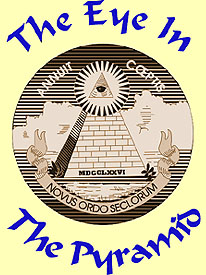Bavarian Illuminati Home Page
"Today the World, Tomorrow the Solar System"
"Würfelwelt Heute, morgendas Sonnensystem"
"Heute die Welt, morgen das Sonnensystem"
The Historical Bavarian Illuminati
Their Origin
According to available documents, the Ancient Illuminated Seers of Bavaria (commonly known as the Bavarian Illuminati) were founded by Adam Weishaupt (Spartacus) on May 1, 1776, based on his early training from Jesuit priests. Other, anti-Masonic sources report that Weishaupt was hostile to Jesuits and the Catholic church.
Johann Adam Weishaupt was born February 6, 1748 in Ingolstadt, Bavaria. He was educated by the Jesuits. In 1773, Pope Clement XIV suppressed the Society of Jesus (the Jesuits), resulting in Jesuits losing their positions at the universities the Jesuits had founded. Shortly after, Weishaupt was appointed as Professor of Natural and Canon Law at the University of Ingolstadt. His appointment was considered controversial by sources both friendly and hostile towards Jesuits. After founding the Bavarian Illuminati in 1776, Weishaupt was initiated into a Masonic Lodge of Strict Observance, Lodge Theodore of Good Council (Theodor zum guten Rath) in Munich early in 1777.
Membership in the Illuminati grew slowly at first. Around 1780, Baron Adolphe François Frederic Knigge ("Philo"), joined the group, and brought with him the rituals for three degrees of symbolic Freemasonry, and a total of ten degrees within the Illuminati. Documents have been found for the first eight levels. From 1780 to 1783 the Illuminati grew from dozens to over 3,000 members.
The professed goal of the Bavarian Illuminati was to teach people to be happy by encouraging them to be good - by illuminating the mind and freeing it from prejudice and superstition. The leaders of Bavaria, by late 1783, had heard rumors that the Illuminati were organizing with the intent of changing the government. As a result, Duke Karl Theodor, Elector Palatinate of Bavaria, issued Edicts on June 22, 1784 for the suppression of the Bavarian Illuminati, and repeated the Edicts twice in 1785. After these Edicts, it was no longer safe to be associated with the Illuminati, at least in Bavaria.
In 1785, Weishaupt was removed from his University position and banished from Bavaria with a pension, which he refused. He first moved to Regensburg, Bavaria, and then received asylum with Duke Ernst II of Sachsen-Gotha-Altenburg, Thuringia, Germany. He was appointed a professor at the University of Gottingen, where he taught until his death on November 18, 1830.
Information about the rituals and goals of the Illuminati were obtained from the public writings of Adam Weishaupt from 1785 on, and from a search of the papers and letters at the residence of Xavier Zwack, a high-ranking Illuminatus in Landshut, Bavaria on October 11, 1786. The correspondence included more than 200 letters between Weishaupt and other leaders of the Illuminati.
There are vast disagreements about what the Zwack documents, not written for the public, actually state. Government leaders in the late 1700s were generally hostile to secret societies, especially those that had as members rich and powerful men, as the Bavarian Illuminati had at its peak.
While membership in the Bavarian lluminati declined rapidly after 1783, there has been a vast array of literature on the group, first by Weishaupt himself, then by authors hostile to Masonry and the Illuminati, and much later a response by the Masons, who were viewed by anti-Masons as being the surviving organization of the former Illuminati. The Masonic literature claimed that the Bavarian Illuminati deserved little more than a footnote in history.
Much of the 20th century literature on the subject is by authors seeking, and finding, vast conspiracies existing over centuries. Since most of this literature is in English, and written by people who never consulted the available Bavarian Illuminati documents in the original German, one should take most of it with a large grain of salt. There do exist many political conspiracies, large and small, over history up to the present. Diligent researchers would learn a great deal by finding original material wherever available, and not relying on second and third-hand accounts for accuracy.
B. Illuminati (c)2011